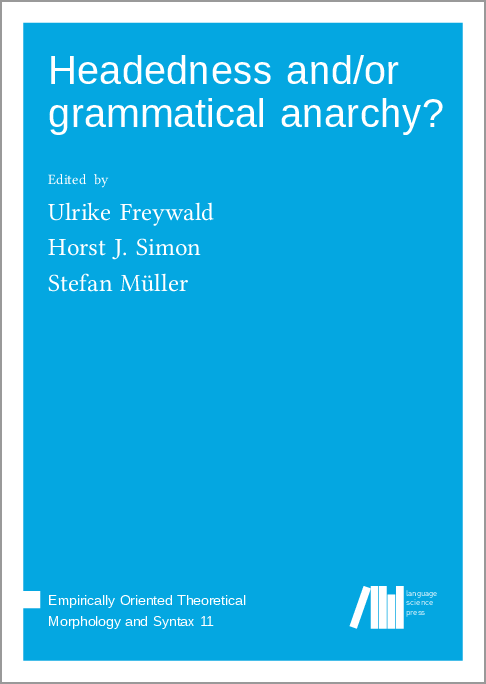We log anonymous usage statistics. Please read the privacy information for details.
Headedness and/or grammatical anarchy?
Keywords:
head, grammarSynopsis
In most grammatical models, hierarchical structuring and dependencies are considered as central features of grammatical structures, an idea which is usually captured by the notion of “head” or “headedness”. While in most models, this notion is more or less taken for granted, there is still much disagreement as to the precise properties of grammatical heads and the theoretical implications that arise of these properties. Moreover, there are quite a few linguistic structures that pose considerable challenges to the notion of “headedness”.
Linking to the seminal discussions led in Zwicky (1985) and Corbett, Fraser, & Mc-Glashan (1993), this volume intends to look more closely upon phenomena that are considered problematic for an analysis in terms of grammatical heads. The aim of this book is to approach the concept of “headedness” from its margins. Thus, central questions of the volume relate to the nature of heads and the distinction between headed and non-headed structures, to the process of gaining and losing head status, and to the thought-provoking question as to whether grammar theory could do without heads at all.
The contributions in this volume provide new empirical findings bearing on phenomena that challenge the conception of grammatical heads and/or discuss the notion of head/headedness and its consequences for grammatical theory in a more abstract way. The collected papers view the topic from diverse theoretical perspectives (among others HPSG, Generative Syntax, Optimality Theory) and different empirical angles, covering typological and corpus-linguistic accounts, with a focus on data from German.
Chapters
-
Anarchy in grammar?
-
Three sources of head effects
-
The NP vs. DP-debate and notions of headedness
-
Headless in BerlinHeadless (nominal) structures in Head-Driven Phrase Structure Grammar
-
Silent heads in Early New High German
-
Categoryless heads in morphology?
-
The Left-Left ConstraintA structural constraint on adjuncts
-
Head alignment in German compoundsImplications for prosodic constituency and morphological parsing
-
Heads and feet in prosody, poetry, and natural metrics
-
Burning down the phrase and heating up the headThe interjectionalization of German ``von wegen''
-
Headedness as an epiphenomenonCase studies on compounding and blending in German




